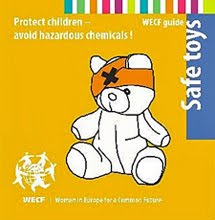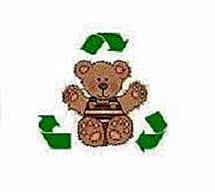 When preparing last year to start the eco-toy webshop "Touffie... lek för en grönare värld", I was concerned not only about the social and environmental issues related to toy production, but very much about toy safety and effects it has on children.
When preparing last year to start the eco-toy webshop "Touffie... lek för en grönare värld", I was concerned not only about the social and environmental issues related to toy production, but very much about toy safety and effects it has on children.Searching a lot to find out who, if anyone here in Sweden, is covering issues related to toy-children safety and had only found (formal) information on "Kemikalieninspektionen" and "Konsumentverket" sites. It seems there is no other organisation (NGOs) dealing with these issues here. I was glad to learn about "Women in Europe for Common Future"(WECF) which I contacted and since February this year, and we have very good co-operation.
WECF is a pan-European non-governmental organisation, a network of 100 women, environment and health organisations working on improving environmental health in 40 countries. They have offices in Germany, France and The Netherlands.
I was so pleased when I learned that prior to the European Parliament voting for the new Toy Safety Directive (December 2008), WECF organised a campaign to raise awareness on the lack of good legislation to protect children from hazardous chemicals in toys, including the proposal for the new Toy Safety Directive.
According to WECF, the new Toy Safety Directive will NOT sufficiently protect the children by still allowing hazardous chemicals (eg. phthalates, brominated flame-retardants, lead, etc.), at levels which scientists say can not be proven safe.
“WECF invited 2 laboratories to come and test toys which parents brought to the press actions, showing how most toys brought by parents contained, among others the class-3 carcinogen formaldehyde, and often also solvents, benzene, and halogenated substances, like brominated flame-retardants.
WECF invited medical experts who advised on preventative action which parents could take. Unfortunately, parents have no information about the types of hazardous chemicals in the toys which their children play with. Some experts suggested not to keep toys in the same room where children sleep, others to let the toys remain outside on a balcony for at least a week, or longer, to allow some of the dangerous substances to leach out of the toys. Others recommended avoiding electronic toys of unknown brands which do not have a policy to substitute dangerous chemicals. And it was recommended to prefer hard plastic over soft plastic, in order to avoid phthalates. Even dolls which have been tested by consumer organisations such as the German Öko-Test institute were found to contain phthalates! Furthermore, it was suggested not to buy toys made of plywood, but only of solid wood, as the glue used for many wooden puzzles, for example, emit formaldehyde.
Concerned parents in Germany can currently only choose from a few toys labelled by “spielgut“, read various test magazines (like Stiftung Warentest and Öko-Test) or trust their own senses. If its smells or feels bad then its probably something which shouldn’t be put in your child’s arms.”
The WECF's actions in Munich, Utrecht, Paris and Annemasse were widely covered by the French newspaper "Le Monde", the first TV station in Germany "ARD" and also "Bayerischer Rundfunk", the commuter papers "METRO" in both the Netherlands and France, the Dutch newspaper "TROUW", and the national evening news television channel "France 3".
Finally, I regret not seeing any similar actions in Sweden but most of all, I am disappointed by the lack of serious interest of media (including some thourough research) on such important issues such as toy safety for our children!
Read more...

















